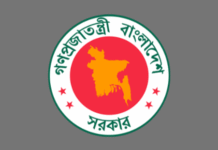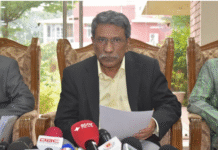Syed Badrul Ahsan

The irony could not have been more apparent.
Here was the month of March, a reminder of the assertive role the leadership of DUCSU and the Chhatra Sangram Parishad played in the rising nationalism of Bengalis back in March 1971. In March 2019, it was once again the Dhaka University Central Students Union (DUCSU) in the public eye, not because of any revolutionary contribution it was poised to make to national politics, not because the reins of office at the premier student body at the premier academic institution in the country was passing from a retiring set of leaders to an incoming one after a long hiatus of close to three decades. On March 11, 2019, an entire nation awaited the results of the elections for a new DUCSU leadership.
But things began to go awry early on. Disturbing reports of voting irregularities, specifically ballot papers already stamped in favour of the BCL, began seeping into the public arena from Bangladesh-Kuwait Maitree Hall. And then came news of the loud protests mounted by students at Ruqayya Hall over attempts to manipulate the vote, compelling the university authorities to suspend voting for a good stretch of time. The provost of Bangladesh-Kuwait Maitree Hall was removed from her position. That ought to have signalled an end to the problem. The restoration of voting at Ruqayya Hall should have been a sign of normalcy being restored.
Unfortunately, things continued to slide. Student organizations other than the BCL were prompt in pulling themselves out of the election on the ground that the voting was going on in circumstances that pointed to clear rigging. In their turn, the leading lights of the BCL quickly called a news conference and tried convincing the media, and by extension the 42,000-plus student voters, that those who had withdrawn from the race had done so in order to avoid the embarrassment of defeat.
Such assertions flew in the face of the realities on the ground. Nurul Haque Nur, vice-presidential nominee of the Quota Reform Movement, was beaten up. At the 18 halls of Dhaka University, an inordinately long spell of time was being expended in voting, with each voter taking between eight and 23 minutes to cast his or her vote. It was a mystery which deepened by the minute. Must the casting of a vote by an individual take that long? Or was there a concealed attempt — not so concealed in the event — to deliberately prolong the voting process in order for the multitudes waiting out there not to be able to exercise their right of choice?
Whatever the response to that question, the intriguing bit was that in the long wait, many waited to vote at the halls before making their sad way away from the premises. It was rather surprising to the point of being bizarre that neither the VC nor any official of his administration thought it necessary to step up to the students to ensure that things were progressing smoothly.
At the halls, as eyewitness reports would have it, ruling party cadres busied themselves in checking the identities of voters. That was not their job, but they were doing it anyway and the university authorities looked away from it all. That attitude of pretending things were going on fine was wrong, an ostrich-like position that was clearly untenable.
Eight teachers of the university — an unprecedented voicing of protest — raised serious questions about the lapses in voting, or the less-than-ideal voting atmosphere prevailing on campus. Their worries were not attended to. The reputation of the university authorities could only slide some more.
Despite all the suspicion and all the allegations, despite the protests of students outraged by all the goings-on and their demand that he quit office, the VC happily came forth with his confident assertion that the voting for a new DUCSU had gone well, that therefore there was little question of a fresh election taking place.
Meanwhile, with news streaming in of Nurul Haque Nur having triumphed in the race for the vice-presidency of DUCSU, it was for the BCL to mount its own protest over what it saw as irregularities marring the election staging their own protests before the VC’s residence. Irony scaled new heights when they too demanded his resignation.
That was not the end of the story, for more surprises were yet to be. Nur, having earlier taken himself and his team off the voting in protest, walked back in when he was certain he had beaten his rivals. Of course, the general secretary-elect was BCL’s Golam Rabbani.
Of course, eight of the nine secretary level positions at DUCSU had gone to the ruling party’s student wing. But none of that deterred Nur from transforming himself from an angry young man to a happy winner at the election. The BCL president promised to work with him, seemingly sealing the pledge.
And thus a new DUCSU was born. Or you could say a premier player in the history of Bangladesh has been resuscitated into life in however erratic a fashion. The degree to which the new leadership at DUCSU will be able to transform itself into an inspirational and idealistic force committed to the promotion of students’ welfare is a reality which threatens to be overshadowed by everything that did not go right on Monday.
That is a pity … in a season when we necessarily recall the history made by earlier generations of student leaders in this land, for this land.
Rashed Khan Menon, Matia Chowdhury, Sheikh Fazlul Haque Moni, Kazi Zafar Ahmed, Tofail Ahmed, ASM Abdur Rab, Shahjahan Siraj, Abdul Kuddus Makhan, Nur-e-Alam Siddiqui, Ismat Kader Gama, Obaidul Quader, Rezaul Haq Chowdhury Mushtaq, Sultan Mohammad Mansur, and a legion of others once made us weave dreams. They, or most of them, went for elections fair and square. They won or lost, fair and square.
And VCs? Except for a few sycophantic ones, decisive, assertive and firm leadership was their forte. They did not genuflect before their students. They showed them the path to enlightenment.
Syed Badrul Ahsan is Editor-in-Charge, The Asian Age.









